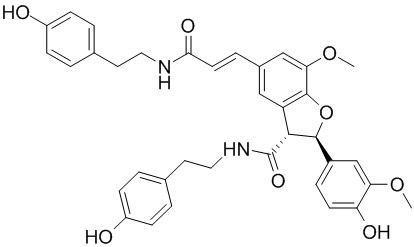Grossamide
Grossamide possesses potential anti-inflammatory effects, it also has potential anti-neuroinflammatory effects against lipopolysaccharide (LPS)-induced inflammatory response in BV2 microglia cells. Cis-Grossamide K exerts a particularly strong anti-melanogenic activity on the cells without high cell toxicity.
Inquire / Order:
manager@chemfaces.com
Technical Inquiries:
service@chemfaces.com
Tel:
+86-27-84237783
Fax:
+86-27-84254680
Address:
1 Building, No. 83, CheCheng Rd., Wuhan Economic and Technological Development Zone, Wuhan, Hubei 430056, PRC
Providing storage is as stated on the product vial and the vial is kept tightly sealed, the product can be stored for up to
24 months(2-8C).
Wherever possible, you should prepare and use solutions on the same day. However, if you need to make up stock solutions in advance, we recommend that you store the solution as aliquots in tightly sealed vials at -20C. Generally, these will be useable for up to two weeks. Before use, and prior to opening the vial we recommend that you allow your product to equilibrate to room temperature for at least 1 hour.
Need more advice on solubility, usage and handling? Please email to: service@chemfaces.com
The packaging of the product may have turned upside down during transportation, resulting in the natural compounds adhering to the neck or cap of the vial. take the vial out of its packaging and gently shake to let the compounds fall to the bottom of the vial. for liquid products, centrifuge at 200-500 RPM to gather the liquid at the bottom of the vial. try to avoid loss or contamination during handling.
Appl. Sci. 2021, 11(23),11099.
Oncology Letters2018, 4690-4696
UDC.2020, 19(4).
Biosci. Rep.2020, 10.1024
Food Chem.2018, 262:78-85
J Adv Res.2021, 35:245-257.
VNU Journal of Science: Med.& Pharm. Sci.2022, 38(2):2588-1132.
Int J Mol Sci.2021, 22(21):11836.
Journal of Physiology & Pathology in Korean Medicine.2018, 32(2): 106-112
Phytomedicine.2021, 93:153796.
Related and Featured Products
J Agric Food Chem. 2010 Apr 28;58(8):4779-85.
Lignans from the tuber-barks of Colocasia antiquorum var. esculenta and their antimelanogenic Activity.[Pubmed:
20359228]
Colocasia antiquorum var. esculenta , a variant of C. antiquorum , commonly known as "Imperial Taro", is an edible vegetable in many tropical and subtropical regions of the world.
METHODS AND RESULTS:
This study with the aim of evaluating the potential of C. antiquorum var. esculenta as a functional food with a depigmenting effect resulted in the identification of a new sesquilignan, named colocasinol A (1), and a new acyclic phenylpropane lignanamide, named cis-Grossamide K (2), together with 10 known compounds (3-12). The identification and structural elucidation of these compounds were based on 1D and 2D nuclear magnetic resonance (NMR) spectroscopic data analysis as well as high-resolution fast atom bombardment mass spectrometry (FABMS) and electron impact mass spectrometry (EIMS). Quantitation of the melanin contents and cell viability in murine melanocyte melan-a cells was used to assess the antimelanogenic activities of the isolated compounds.
Among them, cis-Grossamide K (2), isoamericanol A (3), americanol A (4), 2-hydroxy-3,2'-dimethoxy-4'-(2,3-epoxy-1-hydroxypropyl)-5-(3-hydroxy-1-propenyl)biphenyl (5), and (-)-pinoresinol (6) showed inhibitory effects on melanin production. Compounds 2, 5, and 6 exerted a particularly strong antimelanogenic activity on the cells without high cell toxicity (IC(50) = 54.24, 53.49, and 56.26 microM, and LD(50) = 163.60, 110.23, and >500 microM, respectively).
Mol Cell Biochem. 2017 Apr;428(1-2):129-137.
Anti-neuroinflammatory effects of grossamide from hemp seed via suppression of TLR-4-mediated NF-κB signaling pathways in lipopolysaccharide-stimulated BV2 microglia cells.[Pubmed:
28224333 ]
Grossamide, a representative lignanamide in hemp seed, has been reported to possess potential anti-inflammatory effects. However, the potential anti-neuroinflammatory effects and underlying mechanisms of action of Grossamide are still unclear. Therefore, the present study investigated the possible effects and underlying mechanisms of Grossamide against lipopolysaccharide (LPS)-induced inflammatory response in BV2 microglia cells.
METHODS AND RESULTS:
BV2 microglia cells were pre-treated with various concentrations of Grossamide before being stimulated with LPS to induce inflammation. The levels of pro-inflammatory cytokines were determined using the enzyme-linked immunoassay (ELISA) and mRNA expression levels were measured by real-time PCR. The translocation of nuclear factor-kappa B (NF-κB) and contribution of TLR4-mediated NF-κB activation on inflammatory effects were evaluated by immunostaining and Western blot analysis. This study demonstrated that Grossamide significantly inhibited the secretion of pro-inflammatory mediators such as interleukin 6 (IL-6) and tumor necrosis factor α (TNF-α), and decreased the level of LPS-mediated IL-6 and TNF-α mRNA. In addition, it significantly reduced the phosphorylation levels of NF-κB subunit p65 in a concentration-dependent manner and suppressed translocation of NF-κB p65 into the nucleus. Furthermore, Grossamide markedly attenuated the LPS-induced expression of Toll-like receptor 4 (TLR4) and myeloid differentiation factor 88 (MyD88).
CONCLUSIONS:
Taken together, these data suggest that Grossamide could be a potential therapeutic candidate for inhibiting neuroinflammation in neurodegenerative diseases.



